(NOTE: Mizu is water in Japanese)
It all started on a regular old Thursday morning. I woke up to a flurry of Line messages from other ALTs discussing the endless rain and powerful winds throughout the night; the night before, I read a little bit about Typhoon Etau currently passing over the middle of Japan. “That’s pretty far from me,” I thought, “so I probably won’t be affected too much.” What a fool I was.
The bike to school was already a struggle as the rain was pouring and the force of wind rendered biking futile. Once I got to school, things weren’t as normal as I thought they’d be as classes were cancelled and everyone, students and faculty, was advised to go home, everyone who wasn’t living in a disaster zone at least. Needless to say, I had to stay.
My school turned on the news and there were reports of homes being washed away, families rendered homeless, and a flurry of airlifts throughout the northern part of the city. Luckily, my part of the city had yet to see any major flooding, so, in the afternoon, once it was deemed safe enough to go home, I did, albeit not without a little bit of exploring.
Luckily, before the typhoon, I did a lot of exploring around the city, taking some pictures of the local river on a nearby bridge. Recreating the same shot and going for a before-and-after documentation felt a bit risky since the water edged closer and closer to the bridge, but it felt safe enough to give it a shot anyways. This resulted in some glorious pictures that I emailed to the BBC who later used it in an article! Here were the before and after pictures I took that got featured.
BEFORE: Facing north on the river
AFTER: Facing north on the river
BEFORE: Facing south on the river
AFTER: Facing south on the river
The email I sent also paved the way for an interview too! A news interview, with the BBC!
As I biked around the neighborhood, I bumped into a local Japanese friend on his way to the evacuation center who strongly recommended I come with him. I decided to check it out but probably not stay for too long, considering I felt pretty safe in my dry neighborhood anyways and many locals said that it was probably OK to return home. After dropping in for a bit, meeting some other ALTs (Assistant Language Teachers IE English teachers from other countries besides Japan), and conversing about our situations, I headed home, ready for my Skype BBC interview that night and a meeting with other JET English teachers all over my prefecture the next day. My interview, as you can see here (warning: it’s bad), felt pretty standard; however, she asked me many leading questions that made it seem like the situation was absolutely bananas, yet my neighborhood was luckily in tip-top shape. After the interview, just to be safe, I left the windows open so I could hear any emergencies and proceeded to sleep soundly in my comfortable bed.
This is where my ability to sleep through anything proved somewhat disastrous as I woke up that morning with nonstop helicopters whirring about. I looked out my window and what was normally a quiet suburban neighborhood was a slowly moving brown sea; the flood waters in the northern part of the city finally flowed down to my seemingly safe neighborhood.
Luckily, I live on the second floor so no water was even close to my apartment, but I still didn’t want to take any chances so I packed everything absolutely necessary, put on some snowpants and rainboots, and headed out the door towards the evacuation center, trudging slowly through waist-deep water and trying to remember the parking lot and streets well enough to avoid tripping and falling over.
A rude awakening indeed.
Now, I won’t go into the nitty gritty details as I did above with the remainder of my flood experience. I just wanted to set up what suddenly became one of the most interesting experiences so far in my life. Barely one month and a half into living in a completely new and different country and after finally getting settled in, this tragedy occurred.
The next two days, I stayed at the evacuation center with the other ALTs, quickly developing a new friendship forged on random games, recanting our teaching experiences, and of course, good ol’ crisis. I met locals who were also affected by the flooding and we swapped stories, pictures, and experiences. My time at the evacuation center was a very positive one, with plentiful food and water, a hospitable atmosphere, and accommodations all around. As the waters slowly subsided, the other ALTs and I started to venture out into the town little by little, and this is where it really started to get heavy.
It’s one thing to see a disaster on TV or in news articles, but it’s completely different living through it. Even though you know deep down that everyone is powering through (compared to other natural disasters, the Joso flooding has an incredibly low death toll. That’s not the way I judge disasters, but its still a number that the general public and media often use when reporting), seeing Joso, a city that you finally almost fully explored for the past month, completely submerged was such a visceral, heartbreaking experience.
I remember when I looked up the road towards one of the three high schools that I teach at, the road completely flooded with trash strewn about and little boats floating down with newly rescued locals.
I remember the anxiety in my teachers’ voices as they hurried to their school, calling all their homerooms’ students to verify their safety. I remember biking for hours to see my northernmost school, the one in the center of the flooding, relieved to see that it was OK but horrified upon seeing firsthand the overturned cars and demolished houses only a mile or so away.
As life slowly returned back to normal over the next month for me, the after effects continued to linger in different ways. From the smallest disruptions like an irregular train service, to actual changes, like almost two weeks of cancelled classes due to recovery efforts on part of both the students and the school. For most of that period, I spent my time helping out at my most severely affected school with a range of cleaning tasks, from mundanely wiping down the walls to using a sledgehammer to destroy the bookshelves, as the books expanded so much from the water volume that it was almost impossible to remove them. The trash generated by the flooding was crazy; a nearby lot that was normally completely empty was now over 7 feet tall with trash and debris. My friend had to wait in line of cars for a couple hours to dispose of all the debris from his restaurant business.
I also gained a newfound appreciation for water. Coming from drought-stricken California, I was already relatively frugal with my H2O usage, taking five-minute showers and using a tub while washing dishes to catch water that I could reuse to soak future dirty dishes. But then, I had to learn to be even more resourceful. Even though it makes perfect sense, there was still a slight sense of irony that an inundation of water incapacitated the water supply for a week or so, resulting in constant trips to emergency water supply areas, showering with squirt water bottles, and washing my clothes for the first time ever by hand. Now, I have three buckets in my shower to catch the water when you initially turn on the shower while waiting for it to get to your desired temperature. Then, I use this water to either flush my toilet or for laundry. I recommend this method to everyone!
Another big thing was how completely powerless I felt. Of course I wanted to help, but despite asking around everywhere, it seemed like my assistance wasn’t wholly necessary at many points. I was able to help out at one of my schools, but I wasn’t able to find anywhere else that really needed assistance. Even at the evacuation center, I wasn’t deemed necessary to the cause. While it sounds like I heavily lament this reality, it kind of lends to the idea of independence. Yes, some help is probably useful, but they can do it on their own. They’ve done it before and they can do it again. After all, I’m new here; I don’t know everything about this world yet so who am I to impose my assistance and insinuate that I am the help that they’ve been waiting for. (damn “American exceptionalism”)
As the weeks continued on, everyone showed resilience and the desire for normalcy was strong, to the point where sometimes, you even wonder if anything bad even happened. Another local friend mentioned to me in a mix of English and Japanese, “We are resilient. It may be tough, but we focus on the good.” Despite the displacement that many of my students faced, attendance at all my schools has pretty much remained 100% even though some of them now travel almost two hours to get to school due to all the rerouting of buses and trains. I informed my aunt of this experience and she replied, “Oh that sounds tough, but it’s probably fine. What you are describing sounds completely normal coming from the Philippines.” With a bit of research (read: with a bit of Wikipedia), the Philippines is arguably the most natural disaster-stricken country in the world, although Japan is still not too far behind. After all, it was only three years ago that this area in Japan was also affected by the 2011 Tohoku earthquake/tsunami/nuclear meltdown. When catastrophes become normalized, such resilience is not surprising at all really.
I’m grateful that I didn’t really suffer any direct personal loss through this event thanks to solely my location; if anything, I learned and grew immensely in so many ways. I no longer had my supervisor to help translate as I was often on my own, using my rusty, five-year old Japanese class knowledge. As mentioned above, now I try to avoid being wasteful as much as possible. I am prepared for the next natural disaster as I was affected enough to finally prepare that emergency kit I procrastinated on for so long. I learned about the resilience of the Japanese people and the city around me. I witnessed first hand all the things to do (and not to do) in any dire situations (stay in the evacuation center!).
As terrible as the flooding was, I can’t help but feel grateful for the experience. That sounds horrible; obviously, if I were some omnipotent being, I would not have allowed this, but since I could not prevent it in any way, might as well “go with the flow” (Sorry, too soon?) But anyways, as my Japanese friend said, “it may be tough, but focus on the good.”
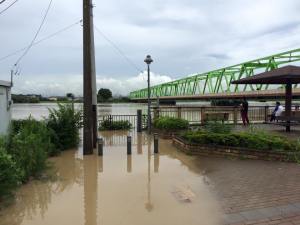


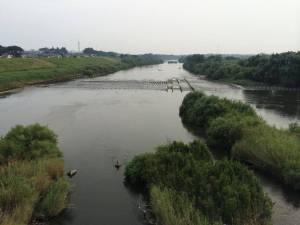
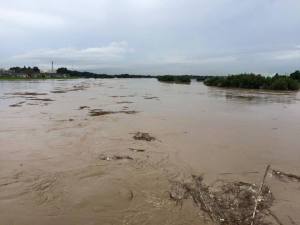
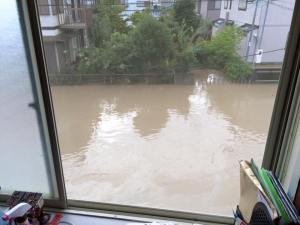
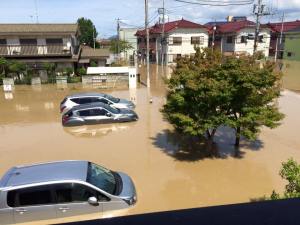
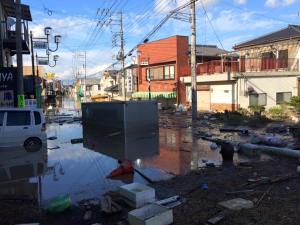
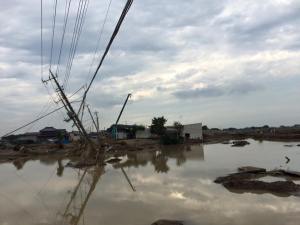
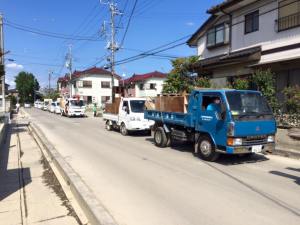
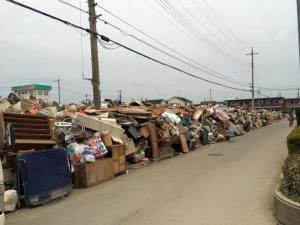
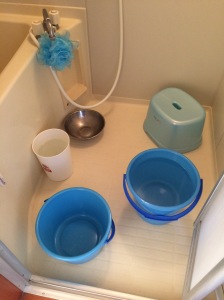
ahhh! im so glad you are safe and that you are looking at this with much resilience and optimism. also i’m glad your students (and everyone you know!) is safe! and, very cool about being published!
LikeLike
Nice blog. Those ALTs that you hung out with sound pretty awesome.
LikeLike
Hi There,
I would love to speak to you about this for a PBS Documentary. Could you kindly get in touch if you are available at sschafer@cineflix.com? Thank you so much in advance, Susan
LikeLike